
Tony Isbell is Krapp. I mean that in the best possible sense.
In the Ostrander Awards first year of existence Tony Isbell was one of two actors nominated in the Best Actor category. He lost. Oh well. He’d be nominated many more times and win his share of play prizes. Now, after 40 years working in Memphis as an actor, director, producer, sometimes writer and occasional cult movie star, Isbell is being honored with the Eugart Yerian award for lifetime achievement.
Isbell will be honored at the Orpheum Theatre this Sunday evening when the Memphis theater community converges at the corner of Main & Beale for Memphis’ annual theater awards, The Ostranders.
Memphis Flyer: Origin stories are a good place to start. And we’ve talked about this before because, like me, you moved here from rural Middle Tennessee.
Tony Isbell: West Tennessee.
Yes, West Tennessee. But you didn’t exactly grow up in an urban environment.
I was born in Union City and lived in a 10-mile radius of Union City and Martin until we moved to Memphis. That would have been 1978. So at this point I’ve lived more of my life in Memphis than where I’m from originally.
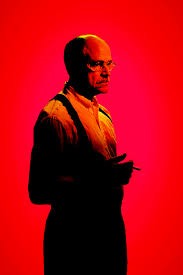
Tony Isbell in ‘Red’
Was theater something available to you?
No. That’s a very short answer. No. I used to say the first play I ever saw I was in. The University of Tennessee at Martin is there. And I’m sure they were doing [theater there]. But when I was a kid was a long time ago. Union City was maybe 10,000 people when I was a kid. Martin was maybe 3-4000. Something like that. So this was a small agricultural community, basically. I didn’t see theater. I saw a lot of stuff on TV of course. And at that time, there was still some stuff that was kind of like live theater. Even when I was in elementary school and junior high, there were no productions in the schools.
What were your creative outlets?
I don’t know if you can classify this is creative, but… For my family, who I love, I probably seem like an alien. I love to read. And I’d read practically anything when I was a kid. But when I discovered things that were like science fiction and fantasy and stuff that today would be called magical realism, I truly fell in love. Those were the kinds of things that I loved almost from the minute I began to read. Some of the earliest books that I remember — I can’t remember the titles — but they were Norse mythology and all that stuff about the Norse gods. Mythology in general. So anything that had a kind of flavor of the fantastic.
I did watch a lot of TV. Probably more than was good for me. But I used to pester anybody I could to read to me. They would laugh at me. In a good way. I was especially fascinated by the comics in the newspaper and I always wanted to know what does this cloud say. What does this cloud say. The act of reading just fascinated me and in Elementary School I got in trouble for reading too much. That sounds crazy, I know. We had assigned days when we could go to the school library. I’d find books that I wanted to read and we go back to class and we were supposed to do something else and I’d hold the book under the desktop and begin reading it immediately and just lose myself completely. I remember one time when the teacher called on me and I was totally in another world.
I do remember being fascinated by television when I was still fairly young, and asking I don’t know if it was my father or who it was. See, I understood the people on TV were actors. I didn’t think Gunsmoke was really happening. But it suddenly struck me — how did they know what to say? “Well, somebody writes it,” I was told. I thought that was so cool. So when I was really young I thought maybe I would be a writer. And I wrote some stuff.
You still do, don’t you?
I haven’t written anything in a long time. I wrote some things for Chatterbox. But I thought I might be a writer. I enjoyed reading too much to be a writer if that makes sense. I still get ideas and I get inspired and I start reading about things I want to do and… well…
Other than that, I grew up in a very rural environment. My grandparents had a farm. They had some dairy cows. And I would spend summers with them, not even 10 miles from where my folks lived. Both my parents worked. My mother was a factory worker. Real working class sort of thing. My dad drove a truck. He drove trucks pretty much his whole life. Not like semis but like local delivery trucks and things like that.
Tony Isbell Awarded Eugart Yerian Award for Lifetime Achievement in Memphis Theater
Did you act things out? Or were you a class clown?
No. I was incredibly shy. And in many ways, I still am. But I was not the class clown or anything like that. If anything, I wanted people not to notice me. It goes back to that reading thing. I would get so involved in reading and watching shows. So caught up in that, it almost seemed like I lost track of what was going on in the real world around me. My mother was worried about me reading so much. She was really concerned that I wasn’t getting enough sunshine and fresh air and stuff. I told you before about how one time she made me give away all of my comic books. Oh my God it broke my heart. I had Spider-Man #1. She made me get rid of it. I think I got a nickel for it. It’s worth what now? $100,000 or something? Something crazy. My mother in particular was really concerned about me reading all that science fiction. She thought it was bad for me. And she didn’t know anything about it, I don’t think. She just saw the lurid covers on the paperbacks and magazines. She thought it was bad for my brain
Did you come to Memphis for school?
I went to undergraduate school at Martin. Marie and I actually got married there. In Union City. We moved to Memphis so she could go to graduate school to get her Masters. We weren’t really planning to stay here. We didn’t think much beyond her getting her Masters. She’s a speech pathologist. She works and has worked for the state of Tennessee for almost 30 years.
When did you start doing theater?
High school. And there are two people I can point to that got me into theater. One was an English teacher named Harriet Beeler. She taught English but at some point she got certified to teach speech. So she had to take some extra courses at the University at UT-Martin, which happened to be right there. One of the courses she ended up taking was a directing class. So, for her final, all the students had to direct a short play and she approached me. I don’t know why. I guess I was a good English student. She asked about doing a small role and I’d never done anything like that before, but for some reason, something in me just immediately responded. With fear and also extreme interest. So I said okay.
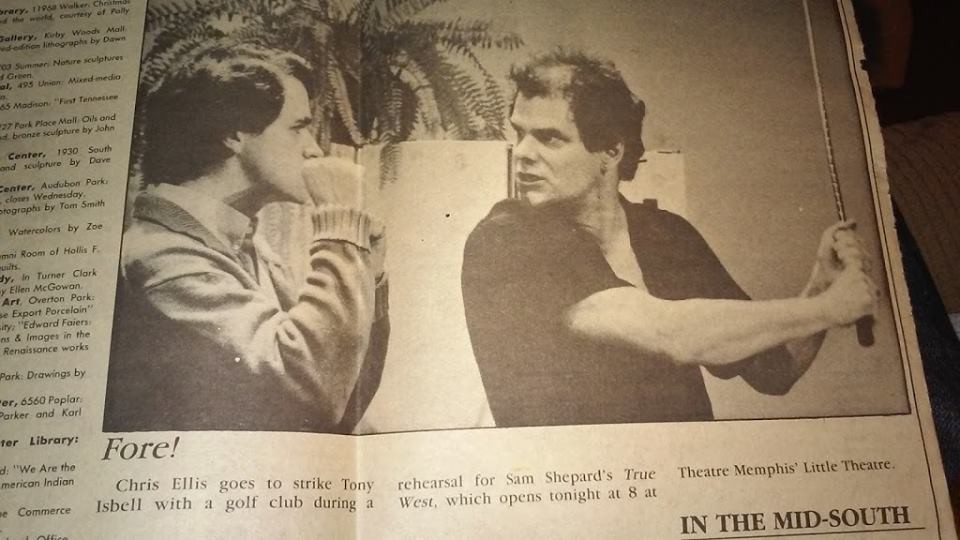
Isbell and Ellis in True West.
I would have been a sophomore or junior at this time. The play was this – oh my God, like the worst Lifetime movie you’ve ever seen. Big tearjerker. I don’t remember the author but it was called The Valiant and it was about this guy who was in prison for murdering a man basically because he needed murdering. I wasn’t playing that role, I was playing a role that had about two lines. A prison guard. Beeler cast a football player to play the hero because she thought he looked right. He was very popular. Well, he didn’t come to the first rehearsal. There had been some mixup or something. But then he didn’t come to the second one. Just didn’t show up. So, I don’t know if it was the second or third time he missed that she says, “Well, maybe I think he doesn’t want to do this play.” By this point, I wanted to play that role so bad. But I was too scared to say anything. So she said, “I’m going to ask Andy to do it.” Andy was another guy in the show playing a guard. And Andy was a nice guy, but he could barely say the lines. So, after about 5 minutes of him struggling with the words she said, “Maybe we should let Tony do this.” Whatever else I may not have had, I was able to read things out loud really well and that was all she needed. She was like, “Oh good you can do it.” So I ended up doing that for the directing class and to this day I can remember how I felt before I went on stage. I was 16 or 17 and I was waiting backstage and my heart was pounding. I think I was actually afraid something bad was going to happen to me because my heart was beating so hard.
So, we went out there and did it and when it was over and we got to take a bow there was such an adrenaline and endorphin rush I literally felt high. Like I was on drugs of some kind. It was unbelievable. I’d never felt like that or imagined anything like that. It was just crazy. I was wearing this grey shirt and I had sweated so much I was wet from my elbow all the way down to my hip. I’d never done anything like that before either. I couldn’t believe it. I must have been a junior because the next year we moved to a new high school, they built a new high school. And I wound up starring in the senior play which was the first senior play we’d ever done since I’d been in that school.
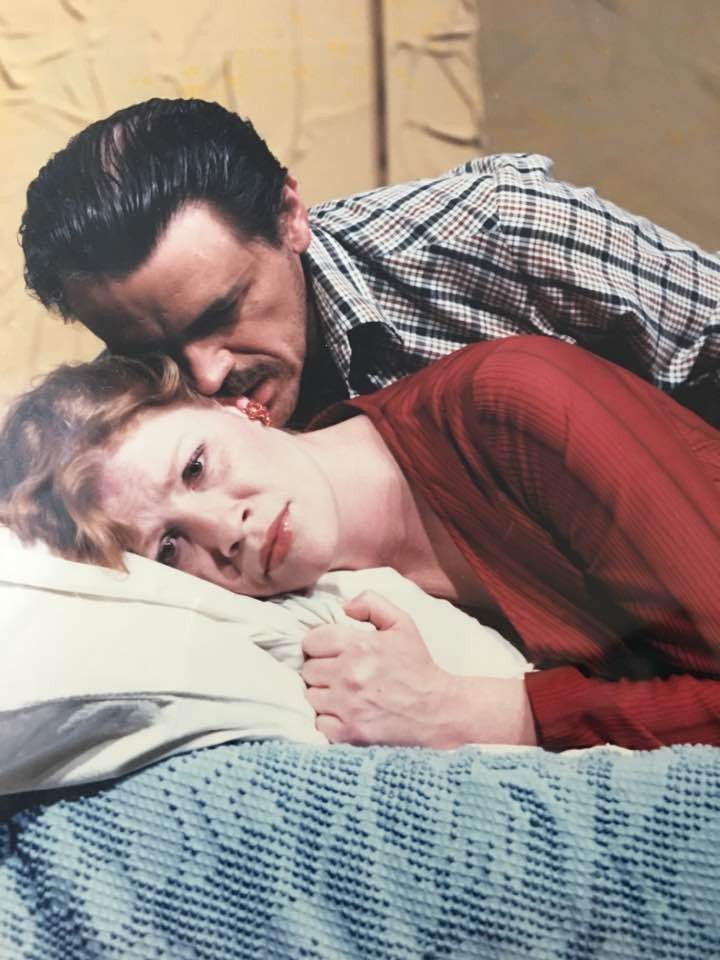
With Deborah Harrison in Fool for Love.
Then I went to UT Martin and studied theater with Bill Snyder all four years I was there and did lots of acting and directing. He was an interesting guy. He was from originally from Memphis but went to Yale and was a couple of years ahead of Bennett Wood who also went to Yale. So they knew each other or knew of each other. Then he went to New York. His real thing was playwriting, he was a playwright and had a minor success Off Broadway with a play called The Days and Nights of Beebee Fenstermaker. Which is partially set in Memphis and partially set in New York. It opened the same season Who’s Afraid of Virginia Woolf and was one of the first acting jobs for Robert Duvall. Bill Snyder was friends with Robert Duvall and Dustin Hoffman and ended up going to Actors Studio for a while. Everything he taught at Martin was extremely Actors Studio based. it was interesting because, when he would direct we would improvise everything. You know, doing it without the dialogue. He’d say, “Okay, you’re doing the play now but don’t worry about getting the words. Just get what’s going on.” It could be helpful. He hardly ever gave us blocking; all of that evolved out of the improvisation.
The show I felt like I made my really big breakthrough on was the production of Marat/Sade, which I would actually like to direct someday.
Me too, but I don’t see that happening.
I love that show. And it’s not really done. It’s like nobody does it anymore and I think it’s just as relevant now as it was back then.
Somehow that doesn’t seem like a very Actors Studio kind of play.
I never knew why he picked any of the plays that he did.
Who did you play in that?
I played The Herald. And improvising all that stuff in the insane asylum was incredibly freeing for me. I’ve told people before, and it sounds goofy. But there was one night in particular when I felt like all my my previous acting had been in a dark room and then somebody turned on the lights. It’s hard to explain. I’ve talked to other actors and they said they never had a moment like that. But it was like I understood what acting was supposed to be like. It wasn’t just saying lines. All of a sudden I was connected emotionally and I really understood the difference, I think. From that point on I was able to access it
So, after college you move to Memphis. What was the theater scene like when you arrived here? Was it welcoming?
Yes. Well, a qualified yes. When I arrived here it seemed like the only places to do theater were Circuit Playhouse and Theatre Memphis. Playhouse on the Square had either just started or was about to start. I came down from Martin a few times to see shows at Circuit. This is when it was still over on Poplar across from Overton Park. A tiny little theater.
I’d heard it was harder to get into Theatre Memphis. At that time, Circuit was doing the kinds of shows I was more interested in. So, for the first eight, nine, or ten years – I don’t know – I didn’t do any shows at Theatre Memphis. It was mostly Circuit because they did the more interesting plays for me. Also, the theater either owned or rented a house and, in the attic there was literally a space called called The Attic Theater that held, I’m not kidding you, maybe 10 seats. Maybe 12 seats. And that’s where I did some of my first stuff in Memphis, because anybody could do anything in The Attic. I did some original scripts there. All you had to do was say, “Hey, I want to do this.”
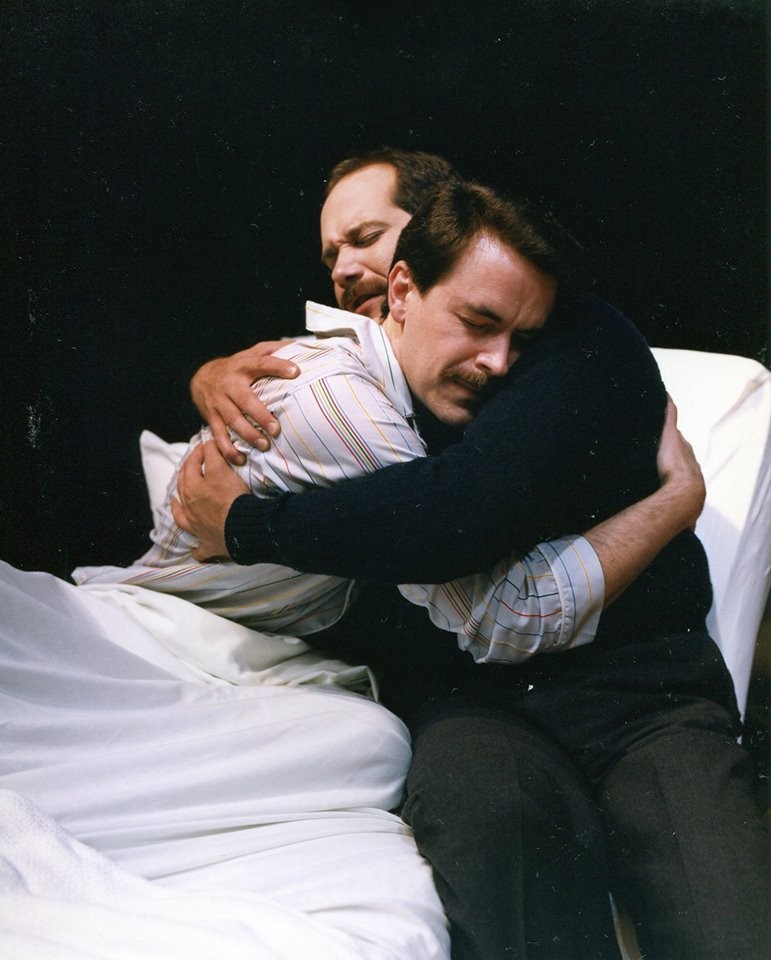
With Mark Pergolizzi in As Is.
The first play I did on a main stage was American Buffalo at Circuit. I played Bobby the kid. That was the first show I did there. It’s a wonderful show. It was the Christmas show — to literally let you know how much things have changed. I can’t remember the exact dates but it ran like December into January.
So this is my first show in Memphis really. Alan Mullikan played the shop owner and Jim Palmer played Teach. And the review was mixed to bad. It was Bob Jennings who hated any kind of thing like that anyway. Didn’t like foul language. So this was not a good show for him to see. I remember his opening of that review and it was the first time I’ve ever been reviewed in the newspaper the opening with something like… Wait. Did American Buffalo win the Pulitzer Prize or was it just nominated.
I don’t think it won. But maybe.
Maybe it was just nominated.
Glengarry Glen Ross won a Pulitzer. American Buffalo won a Tony. But maybe it won the Pulitzer, I hate that I have such a terrible memory for these things. *
Maybe it won. Or was nominated. Because, the opening of the review was something like, “The American Pulitzer committee, whether it should or not, has seen fit to award the Pulitzer Prize for drama to American Buffalo and Circuit Playhouse, whether it should or not, has seen fit to produce it.”
Oh wow. That’s really something.
He didn’t like it at all. He said something about me to the effect of “Tony Isbell, as Bobby, the mentally retarded young thug, doesn’t seem to be acting. He simply is the part.” He didn’t mean that in a good way. That was my first review.
So you wind up staying in Memphis.
It just kind of happened that we ended up staying. I never seriously thought about going to New York or Los Angeles because, frankly, I wanted to be able to do a lot of theater. I didn’t want to spend most of my time hustling auditions for shows that you don’t get. Then Marie got a pretty good job here and I ended up going to Memphis State and getting an MFA in theater because I thought I might go back to Martin to teach. But that didn’t happen, so we just ended up staying here and over the years I’ve gotten to do tons and tons of theater, which is what I wanted to do. And a little film and TV here and there. As far as being a professional, I just didn’t want to face all that. It had no appeal to me.
You bring up film and TV so maybe we should talk a little bit about “I Was a Zombie for the FBI?”
Oh, I loved that. That’s when I was working on my Master’s. I was actually approached by Marius Penczner, who was the director. He said, “Hey I’m going to be making this movie.” And I didn’t know who he was. He had seen me in some theater stuff and thought I’d make a good villain. Especially a space alien. I don’t know if this is true but he said he wrote the part with me in mind because he thought I had a cool demeanor that would work really well.
When I signed on I told everybody that I worked during the day and we’d have to work around that. Well, damned if I didn’t get laid off my job a week or two later. Then I saw the shooting schedule and was like, “I couldn’t have done this if I still had my job.” It was kind of good in that way. We shot for several weeks. Five or six weeks. Maybe a little longer.
And this launches on cable with Attack of the Killer Tomatoes or something like that, right?
They had a premiere at Ardent Studios. They set up all these big screens because there wasn’t one auditorium big enough for all the people. There were five or six rooms they set up chairs in and you could watch on big TV screens. 20-30 people to a room. Then it actually played on Channel 5 a couple of months later. It ended up playing on the USA Network’s Up All Night. I think it was in rotation with Attack of the Killer Tomatoes and they’d play it every four to six months.
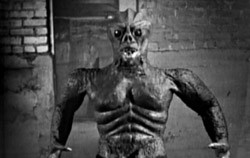
Greatest hits: What are some of your favorite shows you’ve worked on?
Some of my favorite shows I’ve acted in? The Dresser at Circuit. I played Norman and it was the first year they had Ostrander awards. Myself and Jay Ehrlicher were nominated for best actor and I lost.
Jay was nominated for playing Salieri in Amadeus?
Yes, Amadeus. Also, I did Fool for Love. I loved that play. Still love that play. I got a lot of nominations in the early years. And in the later years too. It sounds like bragging, but I got nominated a lot. Acting more than directing. And I did True West a few years later at Theatre Memphis.
With Chris Ellis.
Yes. I directed Memphis’ premiere of Prelude to a Kiss and wouldn’t mind directing that again.
I like that Craig Lucas.
I did the other show of his— the Christmas Show…
Not Blue Window. Reckless!
Yes, Reckless. Loved that show.
This is all main stage stuff more or less, but you’ve also always done independent work too. Like you said you worked in the Attic. But you also produced a show in the basement at First Congo Church long before there was a theater in the basement of First Congo Church.
Thais.
Yes, Thais. And now you have a company for doing independent work. Tell me a little about Quark.
It came about as a kind of joke. I made a joke on Facebook about Krapp’s Last Tape. There’s a line in the play, “I’ve just eaten two bananas and was only able to just keep myself from eating a third.” Or something like that. I made that joke about donuts because I had, that morning, eaten three or four donuts. Adam got the reference. I knew he was a Beckett fan. He wrote his masters thesis on Beckett and he was the one person who responded with the correct line. In a post on Facebook I said it’s the one play I want to act in rather than direct and he said, “Well, let’s.” It turned out to be such a good experience. Such positive feedback from people. Even from people I didn’t think would care for it. A few months after the show I asked Adam, how about we do this on regular basis? Just a couple of shows a year.
We’re both nerdy, so we named the company Quark. Building blocks of the universe. And that’s what we want to focus on. We started with Beckett then looked at maybe doing some Pinter and said, “Maybe we want to do new things. Or things that haven’t been done here. So we started looking for new work that engages the intellect a well as emotions.
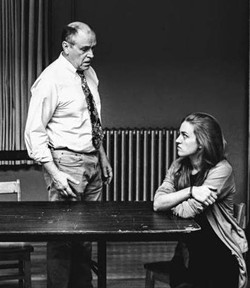
Bye, bye, Blackbird.
I love good design and I’m not just saying that because I’m married to a designer. Good, thoughtful design — which doesn’t have to be extravagant or expensive — elevates everything. But I also love work that strips everything away but the barest essentials. That’s what I love about Quark.
I wanted to get down to just the actors, the audience, and the script and let the rest be bare minimum. The main things I’m concerned with are the actors and audience. The space, the audience, the performers and what happens between them is what’s most interesting to me.
*American Buffalo did not win the Pulitzer though playwright David Mamet was confident it would. It won 3 Tony awards and the New York Drama Circle’s Award for Best New American Play.







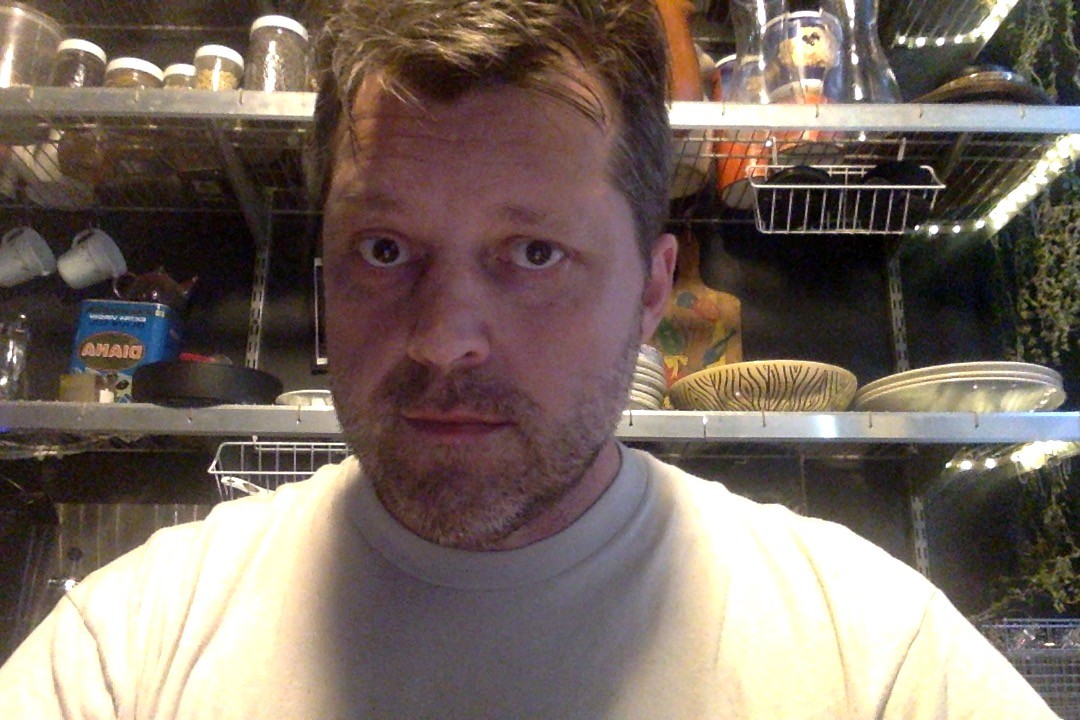 Me
Me 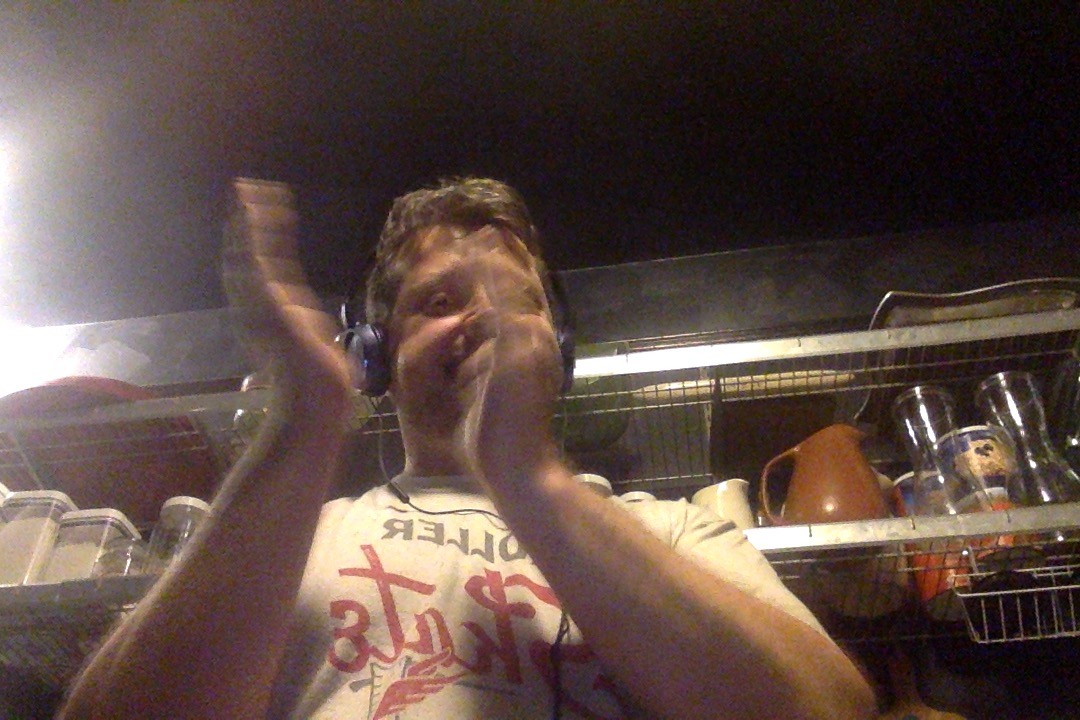 Me
Me 